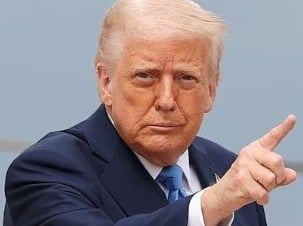Trump Calls on NATO to Impose 50-100% Tariffs on China Amid Tensions Over Russia
Donald Trump has urged NATO allies to impose 50-100% tariffs on China to counter its influence over Russia, weeks after penalising India. Get the latest global trade and diplomacy updates.


By: Bharat Daily Samachar Date: 14 Sep,2025
Trump Urges NATO Allies to Impose 50–100% Tariffs on China to Counter Influence Over Russia, Weeks After Penalising India
Former U.S. President Donald Trump has once again made headlines with his fiery remarks on global trade and security. In a recent address, Trump urged NATO allies to impose massive tariffs between 50% and 100% on Chinese goods, claiming this step is necessary to “break China’s grip over Russia.” His statement comes only weeks after he pushed through penalties against India, sparking debate over his aggressive trade policies and their global consequences.
Trump’s Push for Higher Tariffs on China
Speaking at a political gathering in the U.S., Trump accused China of using economic leverage to strengthen Russia amid the ongoing Ukraine war. According to him, Beijing has become Moscow’s “economic lifeline” by supplying resources, technology, and investments.
Trump argued that only strict financial pressure through tariffs could cut off China’s support and weaken Russia’s military ambitions. He called on NATO countries—particularly major European economies like Germany, France, and Italy—to join the U.S. in raising import duties on Chinese products.
“China’s economy thrives because the world is letting it. If NATO allies impose 50 to 100 percent tariffs, China will feel the heat, and Russia will lose its biggest backer,” Trump said.
The India Angle: Why Trump Penalised New Delhi
What makes this statement even more significant is its timing. Just a few weeks ago, Trump announced new trade penalties against India, citing what he called “unfair practices” in areas like technology, steel, and pharmaceuticals.
For many observers, this move highlighted Trump’s unpredictable stance on global trade—even towards friendly nations. India, being a major player in the Indo-Pacific and a key partner in countering China, saw this step as an unexpected blow.
Analysts believe Trump’s sharp actions against both India and China reflect his broader “America First” approach, where U.S. economic interests are placed above diplomatic ties.
Global Reactions to Trump’s Remarks
Trump’s comments about tariffs on China have sparked mixed reactions worldwide.
European Nations: Some European leaders have expressed concern, fearing that such drastic tariffs could trigger a new global trade war, disrupt supply chains, and raise inflation across the continent.
China: Beijing dismissed Trump’s remarks, calling them “political theater.” Chinese officials argued that imposing steep tariffs would hurt Western economies more than China itself.
Russia: Moscow remained silent but analysts suggest that the Kremlin is closely watching whether NATO nations will actually follow Trump’s aggressive suggestions.
India: New Delhi is treading cautiously, balancing its partnership with the U.S. while also protecting its own economic interests.
Why NATO Matters in This Equation
Trump’s demand that NATO allies join hands is not accidental. NATO, traditionally a military alliance, has been expanding its role into economic and technological security. Trump has repeatedly criticized European nations for not “doing enough” to counter Russia and China.
By calling for joint tariffs, he is essentially trying to turn NATO into a trade bloc against Beijing—something that could reshape global economic alliances if implemented.
Impact on Global Trade and Economy
If NATO nations seriously consider Trump’s proposal, the world could see a major shift in trade dynamics. Here are some possible outcomes:
Higher Costs for Consumers – Everyday goods like electronics, machinery, and clothing imported from China could become much more expensive.
Global Supply Chain Disruption – Many industries rely on Chinese components. Tariffs would push companies to search for alternatives, which might take years.
Opportunities for Other Economies – Countries like India, Vietnam, and Mexico might benefit as companies look for non-Chinese suppliers.
Strain on U.S.-China Relations – Already tense, relations could deteriorate further, affecting everything from technology to student exchanges.
Trump’s Political Strategy
Many experts also see Trump’s remarks as part of his political campaign strategy ahead of the U.S. elections. His tough stance on China has always been a central theme in his politics. By portraying himself as the only leader willing to stand up against Beijing, he hopes to gain support from American voters who are worried about job losses and cheap imports.
At the same time, his decision to penalise India shows that he wants to project consistency—sending a message that no country, friend or foe, is above scrutiny when it comes to trade.
What Lies Ahead?
While Trump’s speech has created global buzz, it remains unclear whether NATO allies will actually adopt his suggestions. Tariffs of 50–100% would be unprecedented in modern trade history and could trigger retaliatory actions from China.
For now, the world is watching closely. Countries like India are in a particularly delicate position—caught between maintaining their economic growth and aligning with Western powers against China’s influence.
Conclusion
Donald Trump’s call for steep NATO tariffs on China highlights the growing tensions in global geopolitics where trade, security, and diplomacy are deeply intertwined. Weeks after targeting India, Trump’s latest push underscores his aggressive economic nationalism and determination to challenge Beijing head-on.
Whether NATO allies rally behind him or resist this approach will determine the next chapter in the global economic order. But one thing is certain—Trump’s remarks have once again placed China, Russia, and India at the heart of a rapidly changing international landscape.
